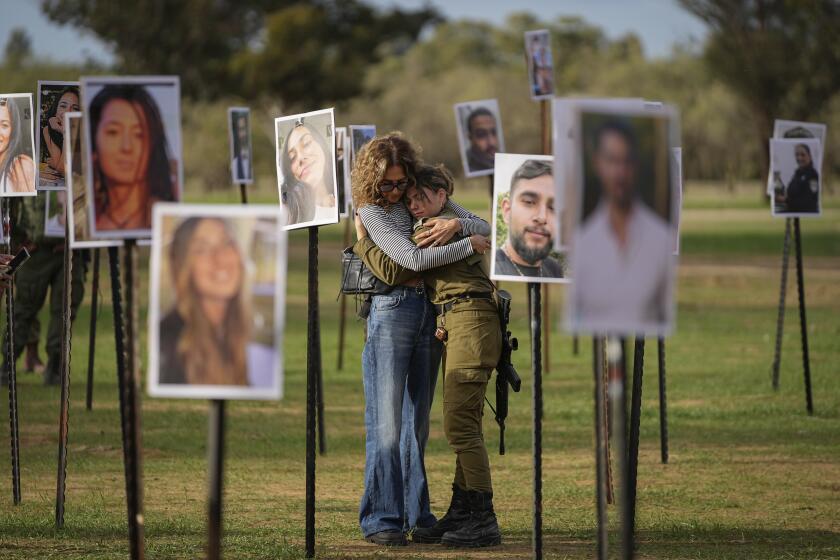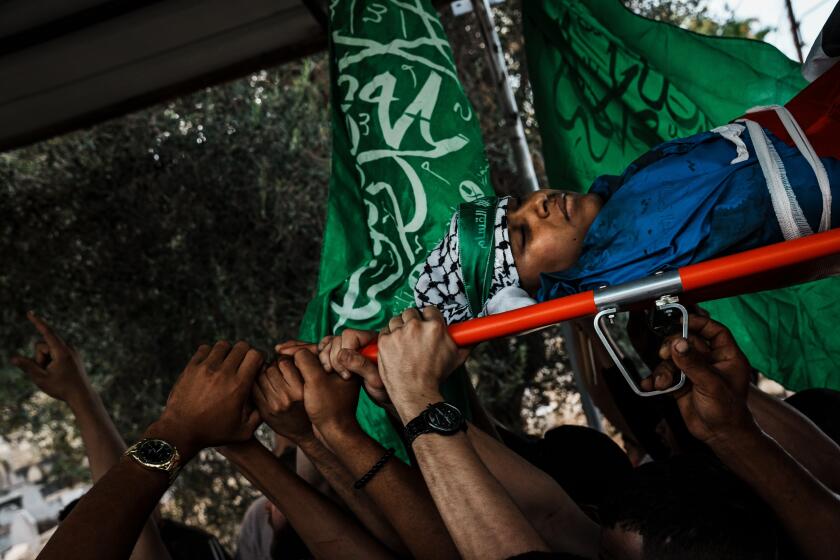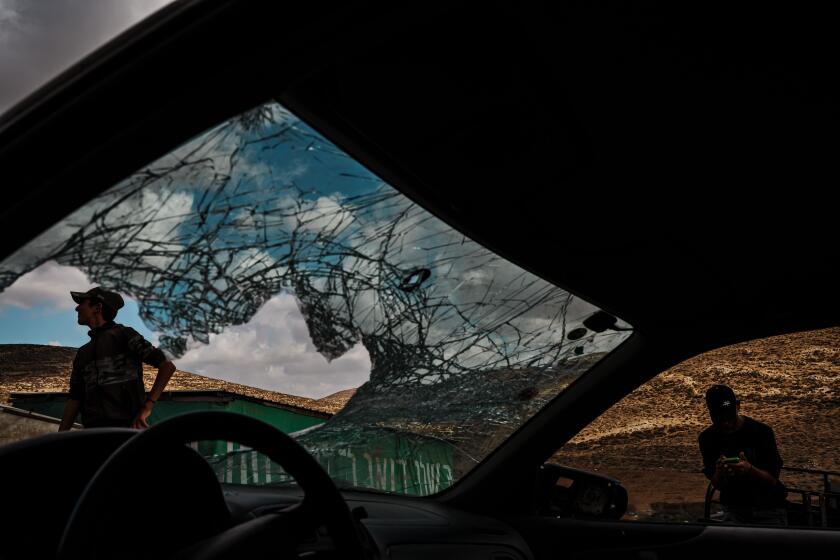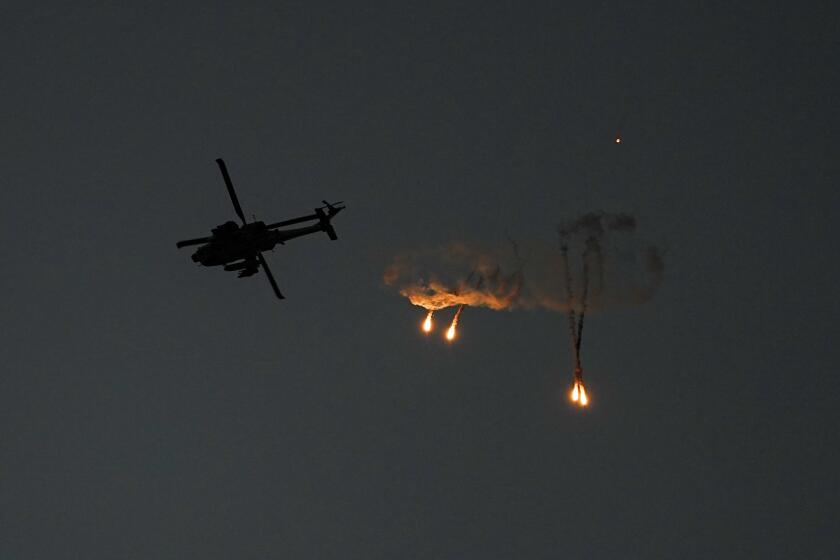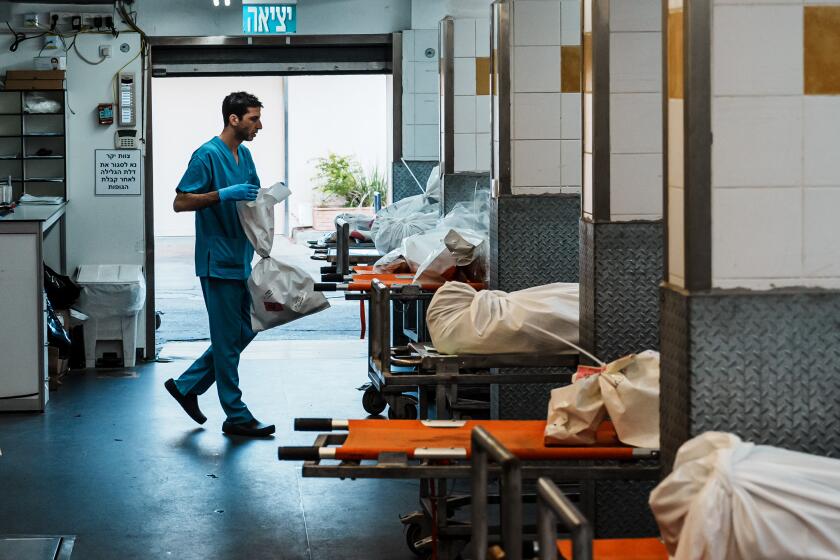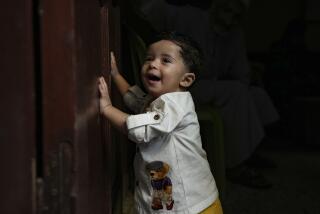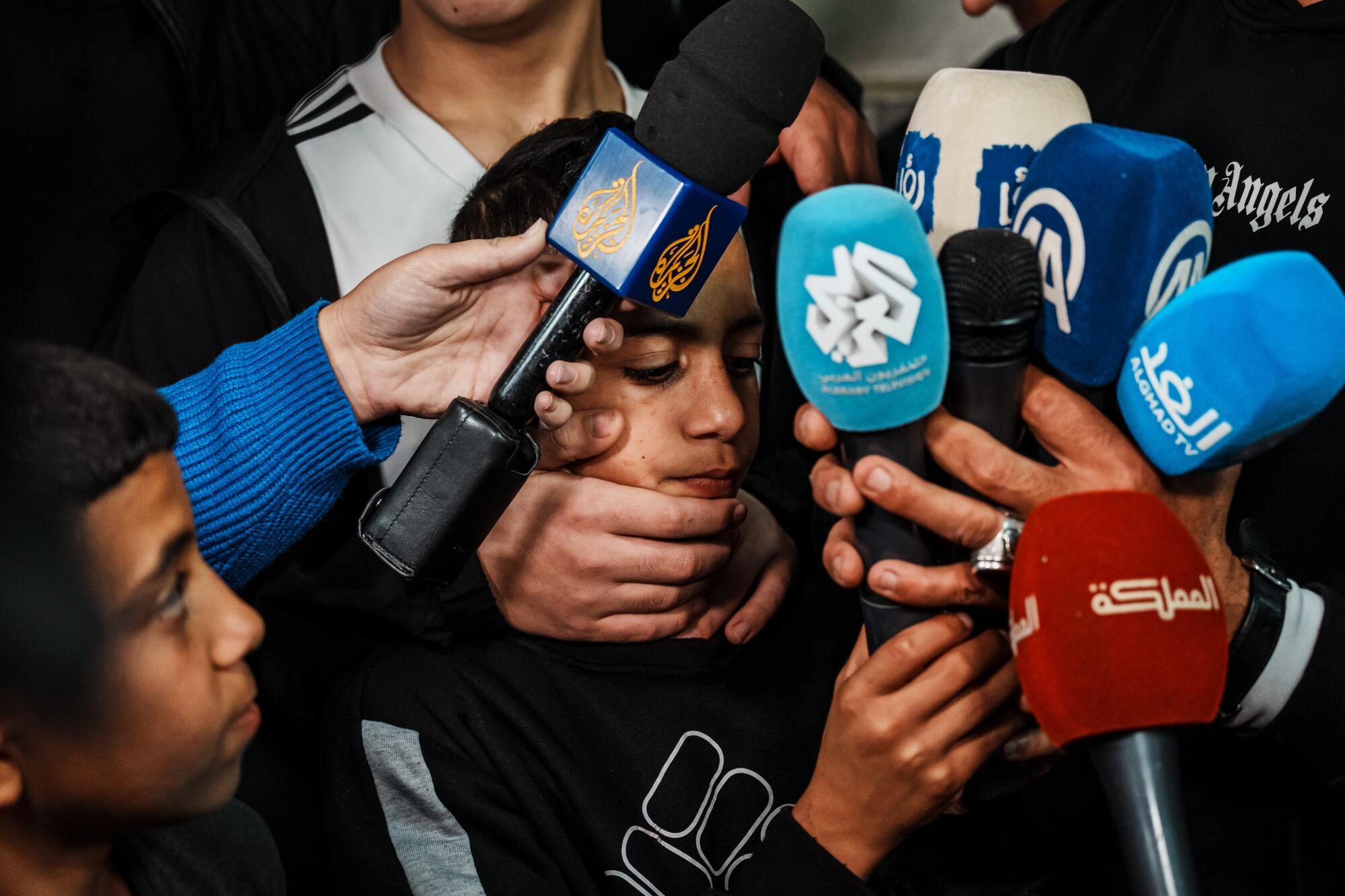
JERUSALEM — As he waited for word on whether his 14-year-old son, Ahmad, would be released in the prisoner-for-hostage exchanges between Israel and Hamas, Nawaf Salaymah entered an East Jerusalem courtroom earlier this week and tried to put another son, Ayham, 13, behind bars.
“I don’t want another postponement,” Salaymah said. “If Ayham goes in now, he’ll come out in the swap between Israel and Hamas, like his brother.”
Although both youths were charged with rock throwing in May, only Ahmad was being held in pretrial detention, making him the youngest Palestinian behind Israeli bars and eligible for the exchanges during the weeklong cease-fire in Gaza that ended Friday. Ayham — too young to be jailed, according to Israeli law — has been under strict house arrest, barred even from going to school.
In this somewhat surreal moment of the Israel-Hamas war, Salaymah’s best chance for having both sons at home was to convince the judge to imprison Ayham immediately. Otherwise, the boy faced months, if not years, under house arrest and then detention as his case unfolded in court.
But 20 minutes later the session was over. Ayham’s trial was postponed once more because, the judge said, the family had refused to cooperate with the boy’s court-appointed correctional officer.
“If he were a Jewish kid, would they prosecute him like this?” Salaymah complained.
The proceedings were part of an Israeli incarceration system that rights groups say detains annually anywhere from 500 to 1,000 Palestinian minors in East Jerusalem and the occupied West Bank for alleged security-related offenses. In September, before the war broke out, the Israeli human rights organization B’Tselem counted 146 minors in Israeli prisons.
As the Palestinian militant group Hamas frees more hostages amid a temporary truce with Israel, a harrowing glimpse of captivity in war-torn Gaza emerges.
Many are held in administrative detention, meaning without charge or trial, for up to six months. Those who do get charged — before military tribunals in the West Bank or civilian courts for youths in East Jerusalem — face a system that operates with a greater-than-99% conviction rate, much of it via plea bargains.
The hostage-detainee exchanges between Israel and Hamas during their pause in fighting have thrown a spotlight on the widespread incarceration of Palestinian minors in Israeli lockups. Of the 300 prisoners whom Israel considered releasing, the majority were young teens accused of throwing rocks and firebombs during clashes with Israeli security forces.
This moment in the Israel-Hamas saga can be glimpsed in the fate of two fathers, strangers who share misfortunes brought on by larger powers and are now left to find their way
Rights groups say the pace of youth arrests has accelerated over the last two months, with at least 145 detained since Hamas’ Oct. 7 attack on southern Israel and the outbreak of war in Gaza.
On Monday, Salaymah, a wiry 48-year-old with a roguish smile and a black-and-white kaffiyeh wrapped around his head, stood outside the East Jerusalem courthouse with Ayham by his side after the boy’s brief court session.
Both boys were charged with stone throwing, serious bodily injury, malicious or negligent damage to property and hostile sabotage activity stemming from a May confrontation with security forces, according to the Israeli prison service. The charges were serious enough to carry a possible 18-month prison sentence, their lawyers said.
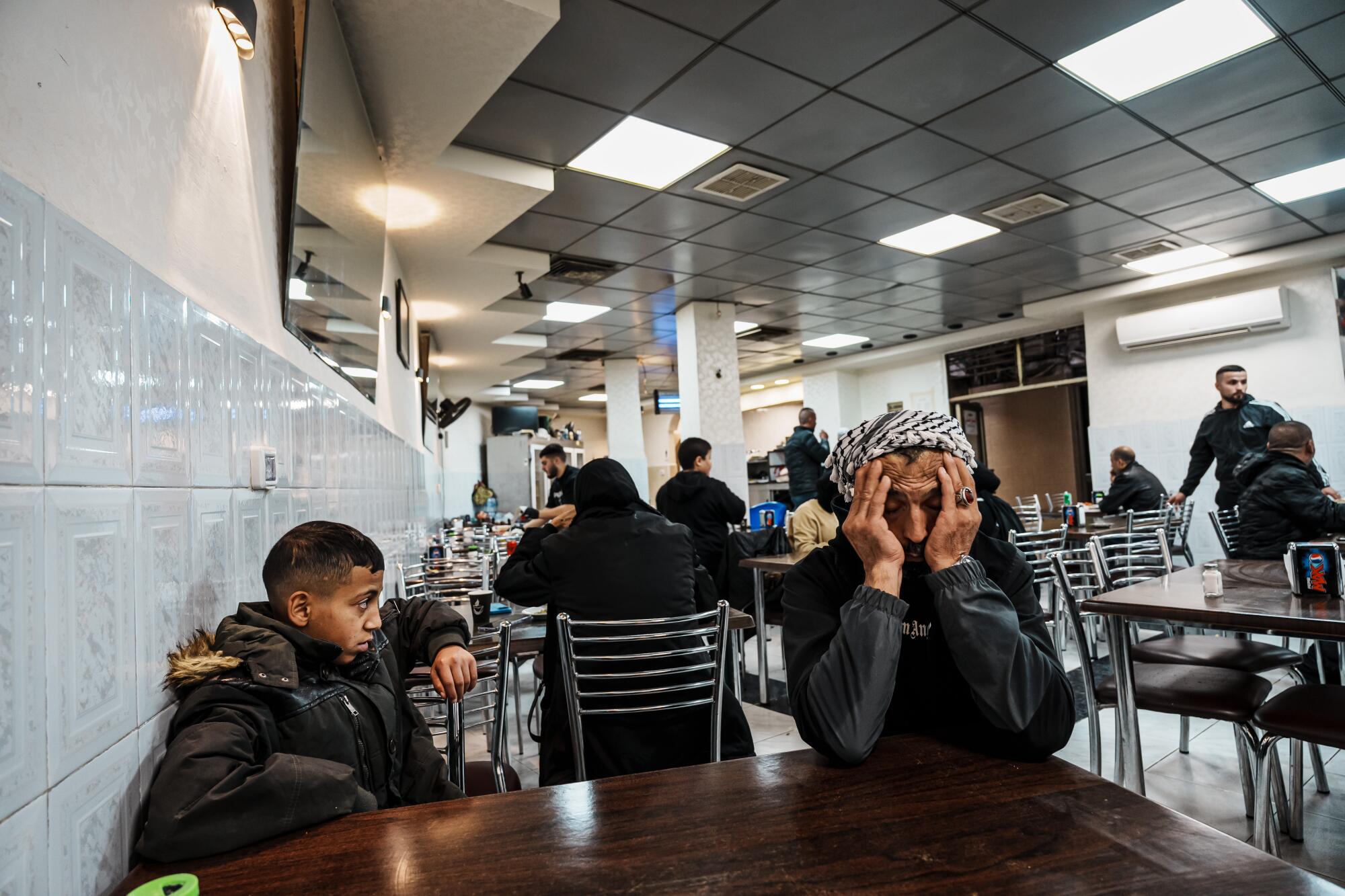
Mohammad Mahmoud, the lawyer hired by Salaymah, said that although the war had spurred Israel’s judiciary to issue harsher sentences, there was still a chance Ayham could avoid prison because of his young age.
“In normal days there’s no justice, no equality between Palestinians and Israelis, but a kid like this wouldn’t get a postponement — just community service,” he said.
Instead, the prosecutor pushed to send Ayham to a juvenile corrections institute, a place for criminal offenders such as drug addicts, thieves and rapists, Mahmoud said.
“That will ruin the child,” the lawyer told Salaymah. “It’s for Ayham’s benefit that you cooperate with the court.”
Salaymah seemed unconvinced, still preferring that his 13-year-old be hurriedly dispatched to prison in order to come out just as quickly.
As wrenching as Salaymah’s choices were, he wasn’t alone in facing them. That day, in front of the court, three other families were in a similar situation. Mahmoud said he was handling at least 10 cases a day because of the intensity of the Israeli security dragnet against Palestinian minors.
Violence surges in the West Bank as Israel increases raids to root out militants. Palestinians say the military is using the war as an excuse to crack down.
“It’s impossible not to find a child with a record — especially in Jerusalem, because there’s more room for confrontations, and surveillance is much higher,” said Mufeed Al-Hajj, a lawyer who has defended children in military tribunals and Jerusalem courts.
The gamut of security-related offenses involving minors includes confrontations with soldiers or civilians, stabbings, associating with a hostile organization and the more amorphous charge of supporting terrorism, which can include social media activity.
The main alleged crime for youth detentions is rock throwing, according to a July report from Save the Children.
That’s how it began for Ayham and Ahmad.
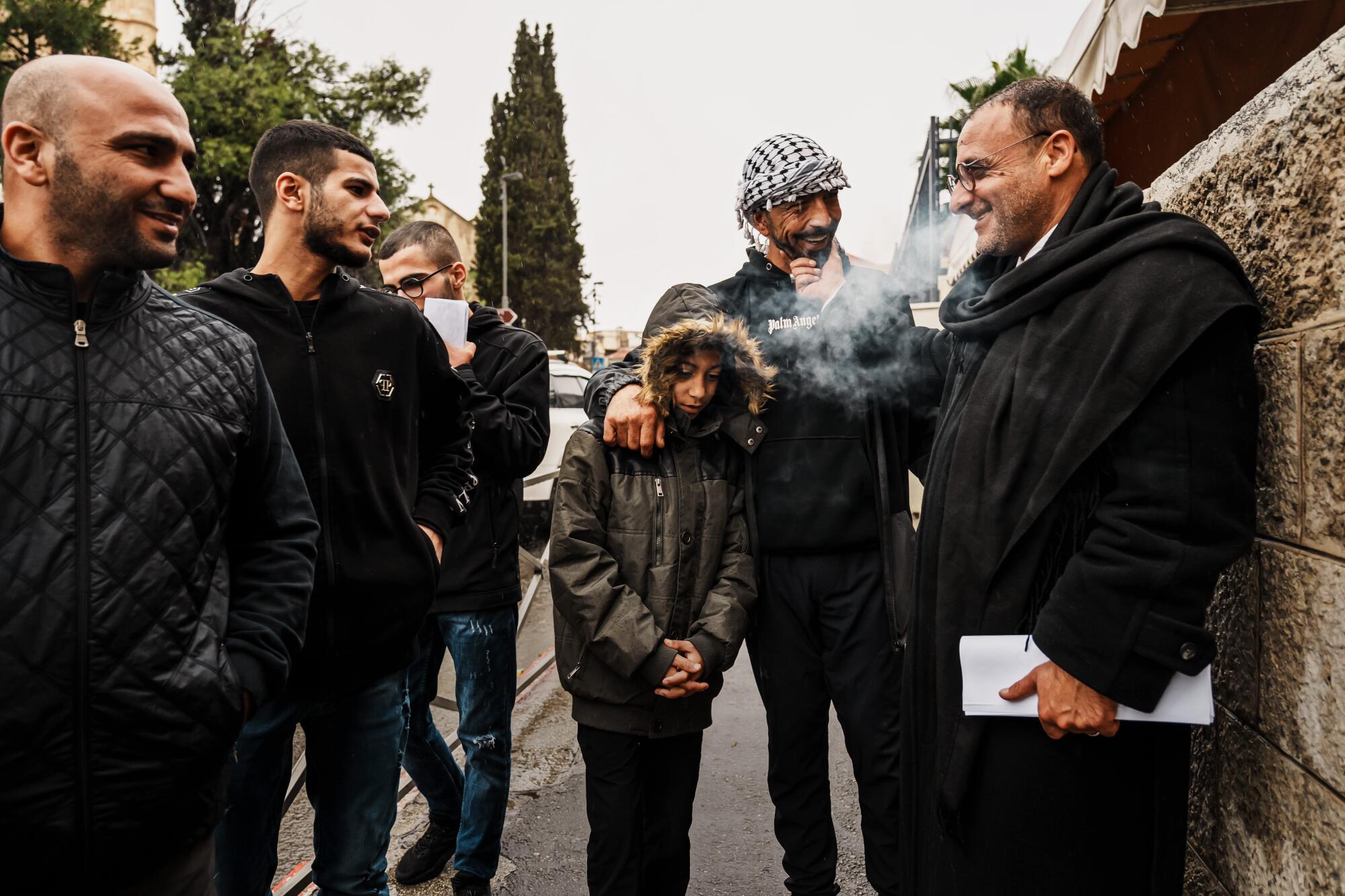
Their neighborhood of Ras al Amud is a clump of buildings creeping up the hill toward Maale Hazeitim, a controversial Jewish settlement in East Jerusalem that has as one of its founders Aryeh King, a right-wing politician who serves as the city’s deputy mayor. (International law considers East Jerusalem occupied territory; Palestinians want it for the capital of an independent state.)
Settlers often come down to Ras al Amud, walking and driving through its streets, provoking Arab residents, including children, who pelt their cars with rocks, Salaymah said. After one such fracas in mid-May, a convoy of Israeli police vehicles drove into the neighborhood several days later at 4 a.m., closed the street, then burst into his home.
‘We are surrounded,’ a Palestinian in the occupied West Bank says. Israeli settlers ‘come in uniforms so you can’t tell the difference between settler and soldier.’
“They’re here to take a big hero. Someone aged 10,200 years,” Salaymah said in a video he posted on social media. He panned his phone’s camera to Ayham, who could be seen calmly putting on pants as police ransacked the apartment, looking for evidence.
Ayham was taken away and questioned by police, but was released later that morning and ordered to stay home. A summons soon followed for Ahmad, who was also ordered under house arrest. Both had a litany of charges filed against them.
A Times special correspondent in Gaza offers a personal account of living in a place where nowhere feels safe.
Their father was leery of having the boys at home under house arrest. Although it might seem like a small mercy — military tribunals for Palestinian children in the West Bank don’t offer the option — many parents in Jerusalem see it as a trap. Having to constantly monitor their kids to make sure they don’t violate the order often means one parent has to stay home and stop working. In some cases, children are ordered to live outside Jerusalem, forcing families to separate or suffer the expense of renting in another city.
“It makes parents their kids’ jailers — and they have to pay for the privilege,” Al-Hajj said.
Worse, house arrest doesn’t count toward time served if the child is eventually sent to prison.
“It’s like making the child do two sentences,” Salaymah said. Besides, he added, articulating a sentiment common among Palestinian families in East Jerusalem and the West Bank: He was proud his son was going to prison.
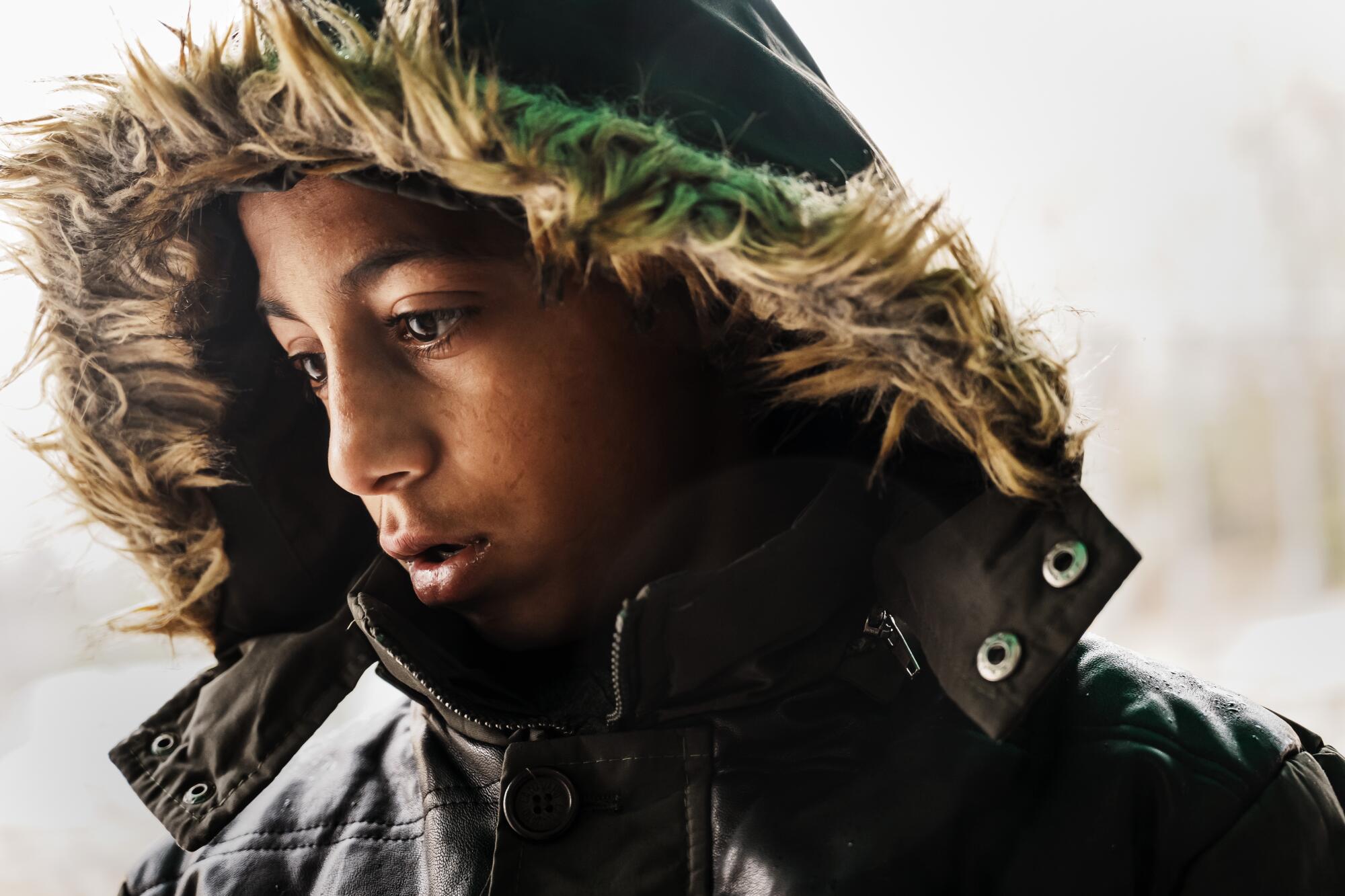
“He’s not in there for drugs or stealing. He’s in there because he resisted against Israel’s occupation,” Salaymah said, adding that everyone in the neighborhood, including himself, had been arrested at some point.
In July, after several more court appearances, Ahmad was sent to Damon prison, the same facility where Salaymah was held decades ago.
“We Palestinians never think it will break us,” he said. “We’re not afraid of it. When he’s released, he’ll be welcomed as a hero, you understand?”
But the already-dismal conditions in Israeli lockups have degraded further over the last two years under Israel’s far-right national security minister, Itamar Ben-Gvir, according to the report from Save the Children, which told of “appalling levels of physical and emotional abuse,” with most of the young detainees beaten, strip-searched, threatened with harm and hit with sticks or guns.
The war has only made it worse, according to interviews with Palestinian and Israeli rights activists and more than a dozen recently released detainees.
Since Oct. 7, those interviewed said, all prisoners have been given only two meals a day and insufficient quantities for everyone in their block to eat; they can no longer receive monthly allowances from their families to buy goods at the canteen; time outside has been reduced; guards have upped their beatings and deploy tear gas for crowd control; all forms of communication and media — televisions, phones, radios — are prohibited; and family visits have been canceled.
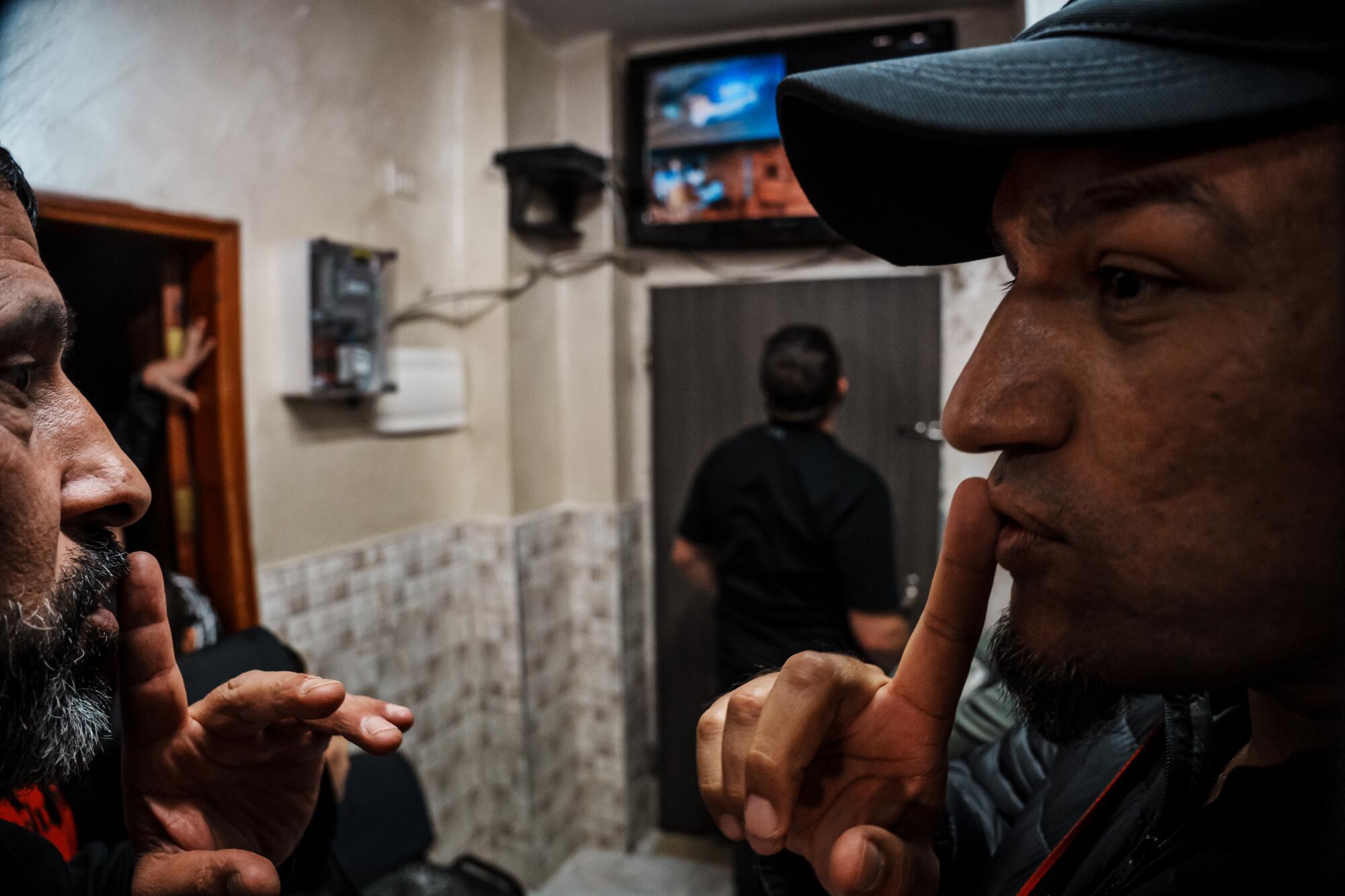
“He’s my child, they take him from his home, and I know nothing about him,” said Ahmad and Ayham’s mother, Sahar Salaymah. Even in normal times, she said, she couldn’t visit Ahmad at Damon prison because she had a West Bank ID, not a Jerusalem resident’s card.
“The last I heard from Ahmad was Oct. 4. He said he needed winter clothes. I bought them but they wouldn’t accept them,” she said of the Israeli authorities. “I went home and went from room to room, crying for hours.”
Israel bombs Gaza and Hamas aims rockets at Israel as top U.S. diplomat departs region. But now-expired truce saw scores of Israeli hostages and hundreds of Palestinian prisoners freed.
She is terrified of the prospect of Ayham being sent to prison — even though her husband was intent on having it happen as quickly as possible so that the boy could be eligible for a captive swap.
“One child imprisoned is enough. It’s something that affects you forever. I don’t want this for him, that he loses school,” she said.
She was the first to see Ahmad’s name on the list of 300 Palestinian prisoners to be exchanged for Israeli hostages in Gaza. She ran to her husband to show him, then started calling family members.
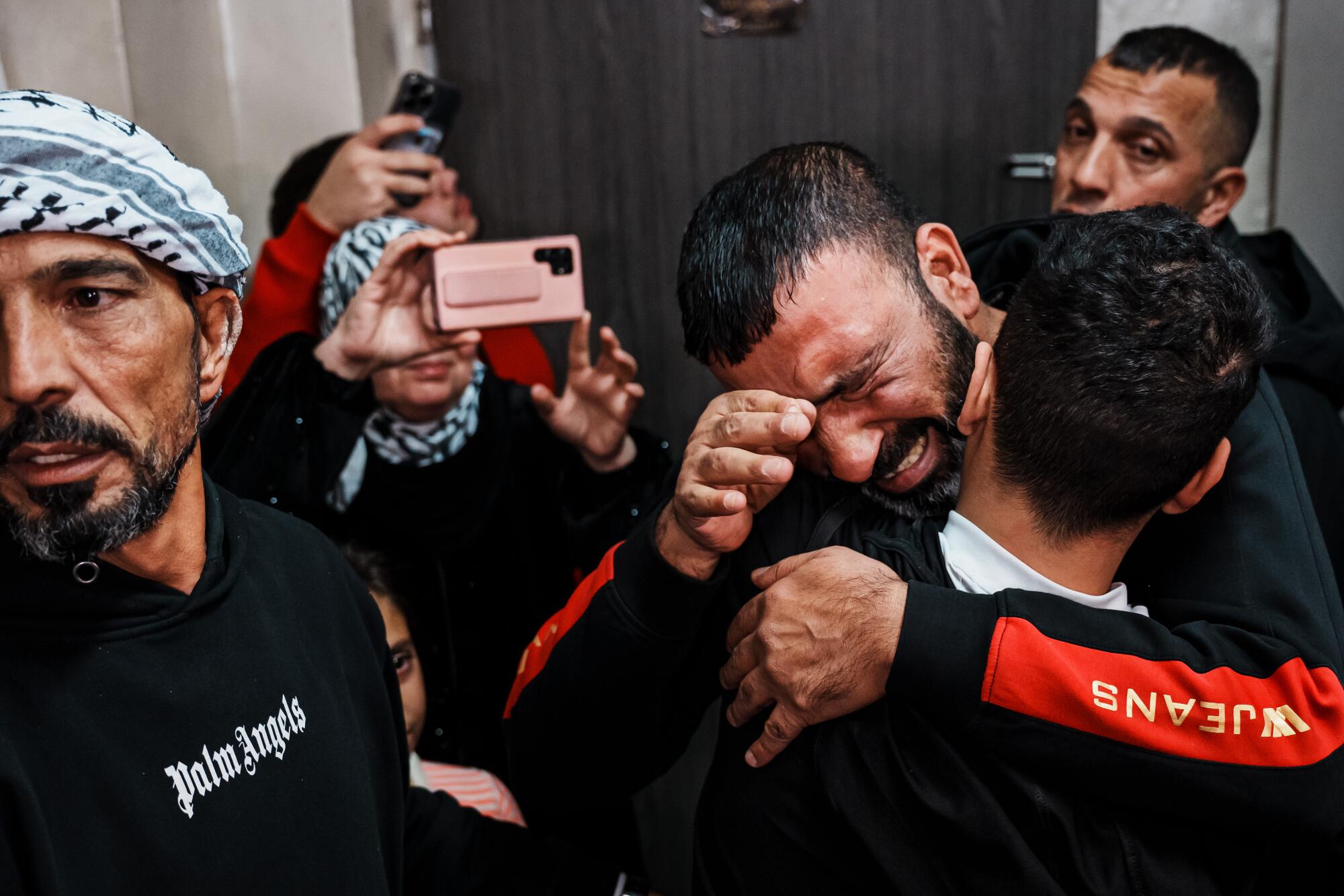
She made plans to make maqluba — a pot of rice, meat and cauliflower garnished with nuts and saffron, her soon-to-be-freed son’s favorite dish.
On Tuesday, the first day of an extension of the original four-day truce, the Salaymahs got word from Israel’s security agency that Ahmad would be released that night. Only one parent was allowed to wait for him outside the loathed West Jerusalem prison known as the Russian Compound.
Fighting pauses in Gaza for a hostage-prisoner exchange. But Israel vows that the war will continue, and has shown no sign of relenting in its determination to destroy Hamas.
A forensic investigator in Tel Aviv works to reassemble remains of victims of Hamas militants, trying to understand the causes of death and the underlying cruelty.
“They threatened us not to have any signs of celebration,” Salaymah said, citing directives from the far-right Israeli national security minister, Ben-Gvir, who banned any expressions of joy from Palestinian parents reunited with their children, describing them in a statement last month as celebrations that gave “backing to those human scum, for those Nazis.”
Nevertheless, as night approached, relatives and friends gathered in a house near the Salaymahs’, careful not to make noise when police vehicles entered the neighborhood to check for activity. Ahmad’s mother and his brothers waited upstairs in their home.
Finally, just before 10 p.m., a convoy of police vehicles pulled up, their lights flashing, in front of the Salaymah family compound. A few minutes later, in walked Ahmad, wearing sweatpants, flip-flops and a white Adidas shirt, his father’s jacket around his shoulders.
He looked exhausted, his eyes darting from one face to the other as his family engulfed him in hugs, cameras catching the moment. Salaymah corralled his family onto the couch as he clutched six microphones in his hand like a bouquet, telling journalists of his gratitude to the “resistance against occupation” and the people of Gaza for his son’s freedom. Ayham sat cross-legged in front of Ahmad, shy but calm.
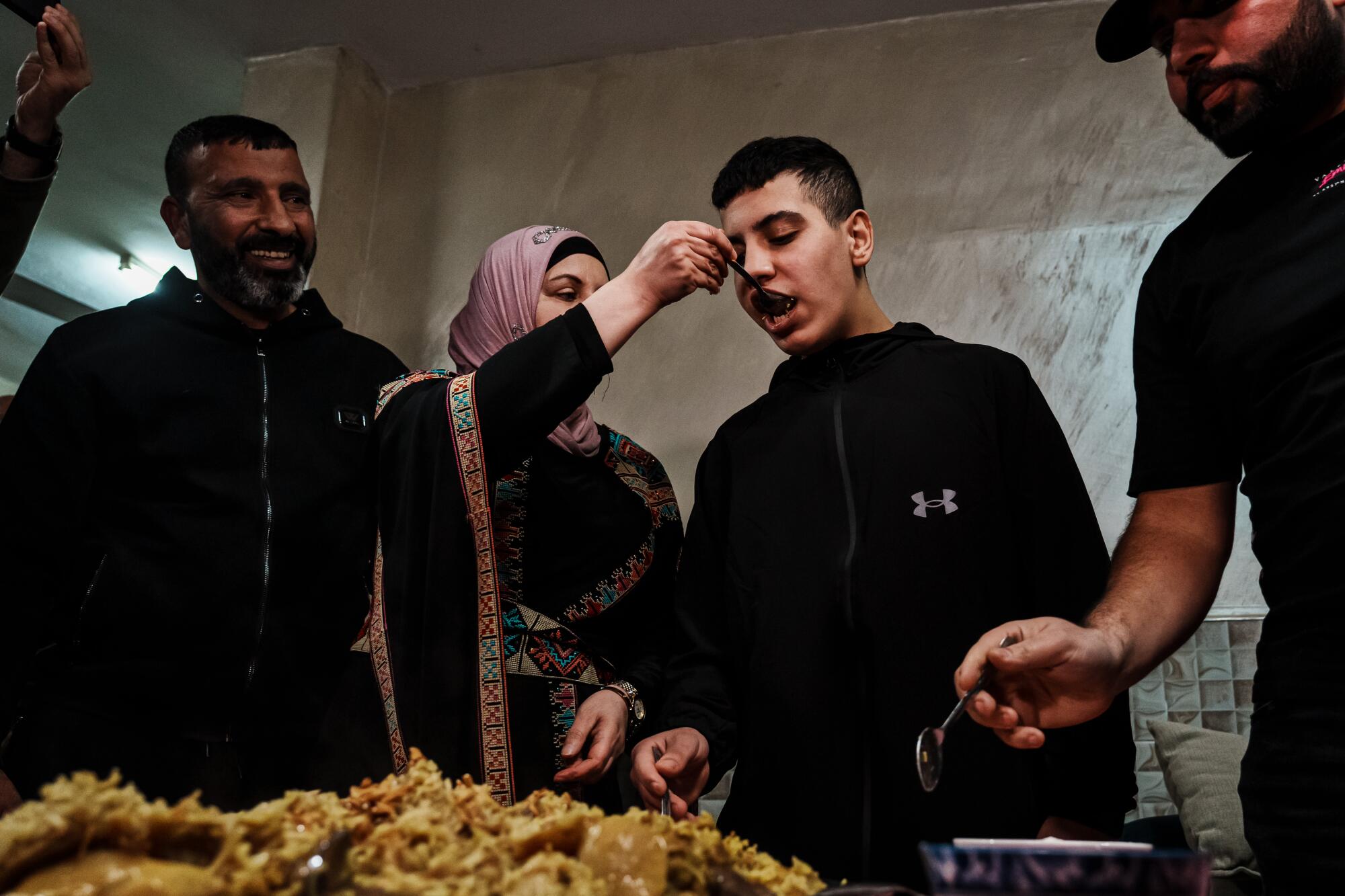
Their mother brought out pots of food and spread them on a long table. She grabbed a spoonful of rice and meat and fed it to Ahmad, who stood beside her, then kissed the top of her head. She closed her eyes, a small smile on her face.
“I can’t believe he’s here,” she said.
A TV reporter thrust a microphone in Ahmad’s face and asked him where he wanted to go from here.
“School,” he said simply. “That’s it.”
More to Read
Sign up for Essential California
The most important California stories and recommendations in your inbox every morning.
You may occasionally receive promotional content from the Los Angeles Times.
